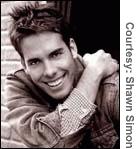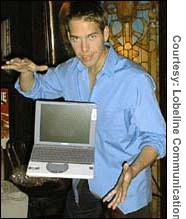|
Getting Started: Magicians
|
 |
July 2, 2001: 7:01 a.m. ET
Being a magician takes hard work and a true passion for the craft
By Kamala Nair
|
NEW YORK (CNNfn) - From Harry Houdini's death-defying escape numbers to Harry Potter's magical battles against the dark forces, magicians have been a source of entertainment and intrigue for all generations. Their ability to pull objects out of thin air and then � abracadabra � make them disappear again has inspired awe among audiences for as long as magicians have been pulling white rabbits out of top hats.
But being a successful magician requires more than just a fancy wand and a deck of marked cards. It takes years of practice, patience, energy, and above all, a true passion for the craft. Throw in a talent for showmanship and a willingness to take a few risks and you just might have what it takes to become the next David Copperfield.
"Don't try to go professional unless you're truly committed to magic," advised George Schindler, a spokesman for the Society of American Magicians. "You can always keep doing it as a semi-professional hobby on the side."
But for those who are willing to sacrifice a secure lifestyle and steady income for the love of magic, the rewards are usually worth it. Magicians will tell you the thrill of making their living by performing before rapt audiences is worth all the sacrifices they made along the way.
One magician's story
Adam Williams, a 25-year old up-and-coming magician based in Los Angeles, has loved magic for as long as he can remember. He began teaching himself tricks at a young age by reading books and watching videotapes.
| |

|
|
Adam Williams | |
At 15, Williams attended Tannen's Magic Camp, a summer camp in Long Island, N.Y., where serious budding magicians learn from top professionals such as David Blaine.
"My experience at the camp had a great impact on me," he noted. "It really inspired me, coming from Ohio where there weren't really any magicians, to be able to see others who were as interested in it as I was."
While still in high school, Williams got his first professional jobs, charging about $50 to perform at birthday parties in and around his hometown. He later went on to study theater, which he hoped would boost his stage presence, at a small liberal arts college in Ohio.
As he began to attract higher profile clientele, he expanded his marketing tactics beyond simply handing out business cards to distributing demo-videos. In order to attract a higher profile clientele, he videotaped himself performing so potential clients could see his work before hiring him. To make the video, he spent $5,000 on the rental of a theater and for production costs.
"If you want to work at higher profile venues, you need to have a video that shows exactly what you can do," he said.�
The investment and the effort paid off big for Williams. A week after his college graduation, he was invited to perform at the Magic Castle, a prestigious private magic club nestled in the hillside above Hollywood Boulevard dedicated to the advancement of the art of magic.
The club, a Victorian mansion converted into a private club for magicians, is for young magicians among the most coveted places to perform because of its high visibility in the magic world.
Magical marketing strategies
Williams' appearance at the Magic Castle, along with the creation of his Web site, have been among the most important turning points in his young career. Since then he has booked many high-profile gigs on cruise ships, college campuses and recently appeared in the pilot episode of the MTV variety show "It's Your Turn."

|
|
|
Williams performing a magic trick | |
"My Web site has been the most cost-effective way to promote what I do," he said. "It's the best thing that happened to my business."
Web sites have become an increasingly popular and successful marketing tool for magicians. Williams stressed that the key to successful marketing is to constantly find new ways to promote one's business.
Joining magic societies is another popular way for magicians to promote themselves. Membership in societies such as the Society of American Magicians, the International Brotherhood of Magicians, the Society of Young Magicians, and All Magic Guide can help newcomers become better known in their area.
However, all the marketing tricks in the world aren't going to help budding magicians if they can't deliver on stage. According to Williams, interaction with the audience is a key element in being a successful magician.
"I think my accessibility and love of interacting with my audience members both during the show and after really sets me apart from other performers," Williams said. "I don't try to put on a persona. I am just showing a part of myself to the audience in my performances."�
Schindler emphasized that magic nowadays is more about the performer than the tricks. "If you are entertaining, you will bring in more revenue," he said. Of course, performing tricks that require more creativity than sawing a scantily clad woman in half doesn't hurt business either. Williams' signature trick involves escaping from being tied down in a straitjacket with a paper bag over his head while being whipped by a midget dominatrix.
Magic has taken a decidedly hip, modern twist. While Schindler pointed out that there is an audience for everybody, from a business standpoint, a younger audience is most desirable because corporate shows bring in higher revenue, and as Williams noted, the corporate audience has shifted to a younger age group.
However, not all magicians become professionals at such a young age as Williams. In fact, Schindler pointed out that the majority of magicians do magic as a hobby when they are young but quit in their twenties to pursue different endeavors. They often return to magic as professionals after they have established other careers and lifestyles.
Can you make a living?
So is it possible to make a living as a magician? It is, but it's not always easy. In heady economic times, there tends to be more work for magicians, and when the economy stumbles, demand falls along with it.
Magic's popularity comes and goes depending on other factors as well. Last year, for example, demand was high after David Blaine's ABC special "Frozen in Time," which featured the magician encased in a giant block of ice in New York's Times Square for three days. The Harry Potter books have also provided the profession with a much-wanted lift.
Annual revenue depends on every magician, but Schindler noted earnings range from approximately $100 per show at the lowest level to $850-to-$15,000 on the upper end. But because of the competitive nature of the magic business, only very few ever make it to that top level of success.�
When Williams first started out, he charged $50 for performing at half-hour birthday parties. Today his asking price ranges from $3,000 for a college performance to $5,000 for a corporate event.
But his expenses, too, have increased significantly from his early days. He must account for purchasing new magic equipment, hiring assistants and stage managers, and marketing his performances. Both Schindler and Williams emphasized that magic is a profession that is more about personal satisfaction than money.
"It's as easy to make a living as a magician as you want it to be," commented Williams, "If you limit yourself to only doing certain types of shows, you won't have as much business." He assured that a willingness to try new things, be adventurous, and take risks contribute to not only a more satisfying experience, but also a higher revenue.
For those interested in pursuing the craft of magic, Schindler suggested that the best ways to learn are to go to the library and read books on basic magic, attend magic schools or camps, attend courses at magic supplies stores, or take lessons from established magicians, who generally charge about $50 per lesson.
Starting out as a magician may mean long days and nights of practicing, performing, and an empty pocketbook while trying to build a clientele. But those in the business say if you stick with it, it can be a highly satisfying and exciting profession.
"The best thing about my job is that I get to travel around the world and meet so many people and for a moment, transport them into a sort of fantasy and unreality," said Williams enthusiastically, "To be able to take a blank stage and create this show that makes so many people happy is amazing. I just love magic." 
|
|
|
|
|
 |

|

